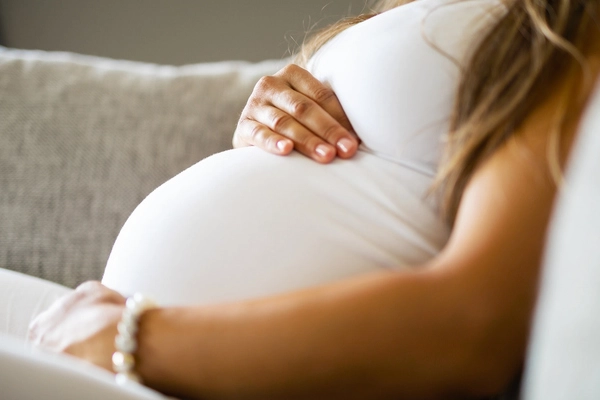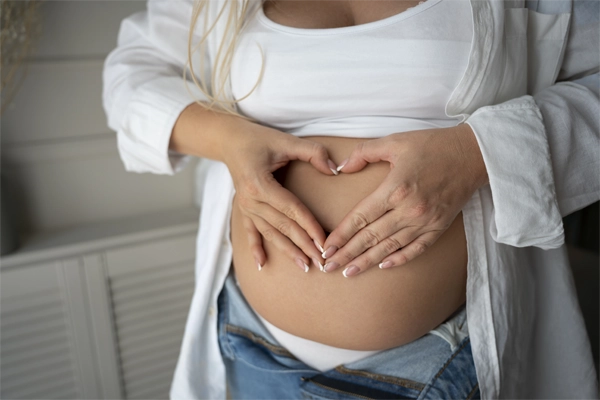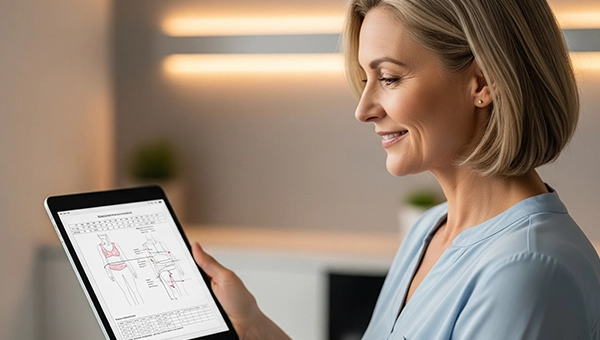Pregnancy and motherhood
 15 September 2025
/
15 September 2025
/
 6 minutes
of reading
6 minutes
of reading

Pregnancy and motherhood are beautiful, but apart from their obvious advantages they have a few drawbacks.Urinary incontinence is one of them – it concerns as much as 30% of pregnant women.
Why does urinary incontinence occur in pregnancy?
The daily volume of urine and the frequency of urination increase during pregnancy. In the I and the II trimester the amount of urine passed during a single bladder voiding increases – in the III trimester the volume drops down, but the urge to visit the toilet is much more frequent. The capacity of the bladder pressed by the uterus gets gradually smaller, and the volume of the urine filling the ureters increases. What is more, two-thirds of women in the final stage of pregnancy experience the urge to urinate at night.
The type of incontinence experienced during pregnancy is mostly stress incontinence. It develops in the III trimester when the uterus is at its biggest. Usually the incontinence means losing a few drops of urine what is difficult to notice when a woman frequently changes her hygienic pads, but sometimes the problem might be more serious.
The extent of hormonal changes during pregnancy and childbed is so big, that it is quite a burden for the whole organism. The growing baby expands the uterus walls taking over the entire available space in the abdomen. Other organs need to give up their place. They move back, and now, squeezed inside the abdomen, need to work under much more difficult conditions. The baby jostles and kicks more and more and may occasionally hit the bladder. It happens that the kick is so strong that the weakened sphincter muscles let go causing urine loss. Additionally, the bladder under the pressure of the uterus has so little room that the pregnant woman feels the urge to urinate even when the bladder is only filled with little urine.
Pregnancy is also the time when due to the changes in the mucous membrane of the urogenital tract, a woman is more likely to suffer infections – both of the urinary system and of the intimate parts. These infections may cause discomfort during urination and increase the number of urine loss episodes.
 |
Practical advice for a mum-to-be: |
- don’t cut down on your fluid intake despite losing urine
- go to the toilet as soon as you feel the urge – it might be too late if you wait
- if you lose urine when you feel a strong urge visit the toilet every 30–40 minutes even if you don’t feel the urge
- pay extra attention to your intimate hygiene – wear breathable underwear made of natural materials, use intimate wash products and supply yourself with incontinence management absorbent products
- avoid diuretic food and drinks
- prevent constipation
- don’t hold back if you feel the urge to urinate – that can lead to losing urine if the baby kicks the bladder
- at the end of pregnancy make sure that what you consider to be urine loss is not in fact amniotic fluid seepage
- already start toning your pelvic floor muscles
What happens after giving birth?
After giving birth the organism returns to the state from before the pregnancy. The hormonal imbalance and the weakened or damaged pelvic muscles may still be the cause of urine loss, however that should gradually decline and eventually disappear.
 |
In the case of most women the symptoms of urinary incontinence disappear within 3 months from childbirth, or a bit later in the case of women who had given birth several times, or gave birth to a child weighing more than 4 kg. If the incontinence won’t decline after 6 months from childbirth, when the tension of the muscles should return to its normal, it is advised to visit a urologist or a gynecologist and seek medical advice. The doctor will help you find a way to manage your problem. |
Each pregnancy and childbirth weakens the pelvic floor muscles making it more difficult to get them back in shape. More difficult doesn’t mean that it is impossible, though. The Kegel exercises performed systematically already during the pregnancy and childbed improve the condition of the crotch muscles, the pelvic floor muscles and the urogenital diaphragm, simultaneously improving the efficiency of the urethra closing system.
 |
Practical advice for a new mum: |
- allow yourself some time to get back in shape – your body will eventually come back to normal and the incontinence will disappear
- carry on with the Kegel exercises – you can do them anytime, even when looking after the baby
- don’t forget about yourself when looking after the baby – see a gynecologist if you lose urine – ask for advice
- take plenty of fluids, especially when you are breastfeeding
- pay special attention to your intimate hygiene – change your pads frequently, wear breathable underwear made of natural materials, wash your private parts frequently
- don’t hold back if you feel the urge to urinate, especially when you try to make excuses that you don’t have the time to go to the toilet – holding urine can lead to serious conditions including cystitis.
See why it is worth using Seni Lady bladder control pads.





 Homepage
Homepage
